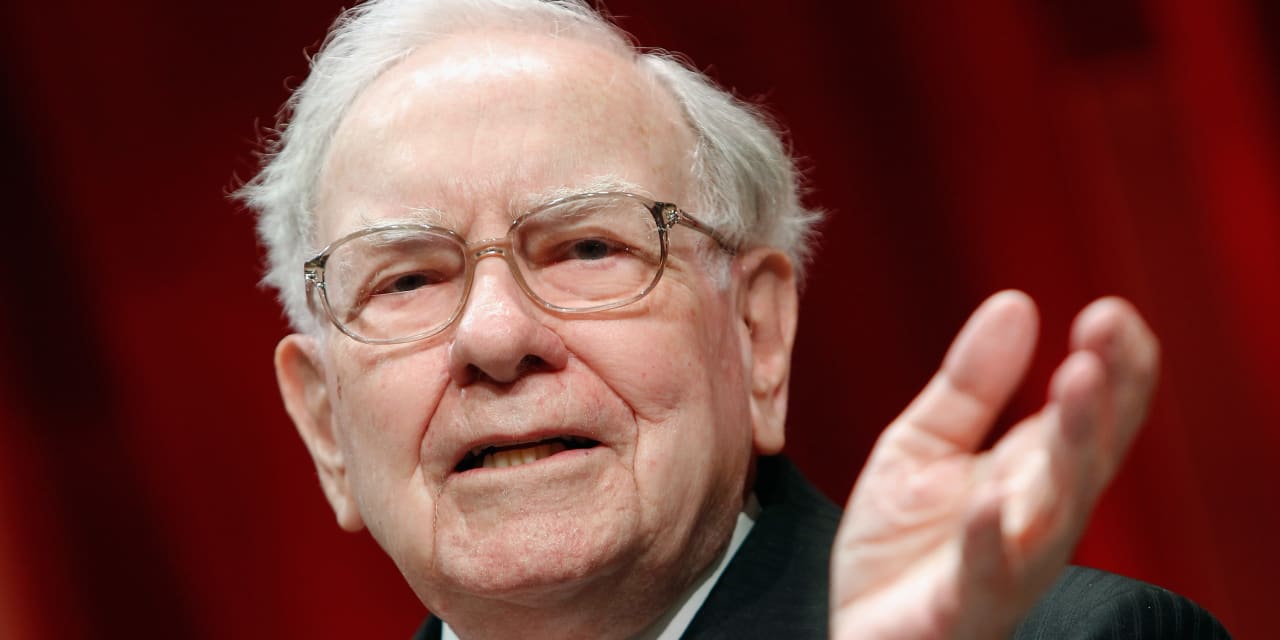Berkshire Hathaway
stock is dropping even though the conglomerate’s third-quarter operating results, disclosed Saturday, easily topped the consensus estimate.
It’s tough to say why the stock (ticker: BRK.A, BRK.B) is lower, but there are some possible reasons. The results excluding insurance and investment income showed pockets of weakness. including the Burlington Northern Santa Fe railroad and some of the consumer businesses.
Stock repurchase activity was light in the period, a sign that CEO Warren Buffett didn’t think the shares were cheap. And Berkshire’s big utility unit faces a potential increase in its legal liability for Oregon wildfires in 2020.
Monday afternoon, Berkshire Hathaway’s Class A shares were down 1.6% to $525,300 Monday while the Class B stock was off by a similar percentage to $346.07. Berkshire stock is up 12% this year, about three percentage points behind the total return of the S&P 500 index.
Berkshire Hathaway said its operating profit after taxes rose 40% to a record $10.8 billion, ahead of the prior peak of $10 billion in the second quarter. Operating earnings per share of about $7,436 per Class A share comfortably topped the consensus estimate by about 14%.
The results are tough to analyze given Berkshire’s huge size and complexity. Buffett’s refusal to hold quarterly conference calls that could help investors understand the numbers makes it even more difficult. Only about half a dozen analysts cover the stock, but their reactions to the results shed light on what is going on.
UBS analyst Brian Meredith trimmed his profit estimate and price target for Berkshire, reducing his 2024 projection to $27,716 per Class A share from $28,405. This means Berkshire is trading at about 18.5 times his estimated 2024 projection. Berkshire now trades for about 1.45 times its Sept. 30 book value of about $363,000 per Class A share.
Meredith reduced his forecasts for earnings at both Burlington Northern and Berkshire’s big reinsurance unit. He said he expects lower shipment volumes and higher costs to hurt the railroad’s results and predicted “lower than expected premium volume” for the reinsurance business.
His price target fell to $620,000 per class A share from $621,745, though he continues to rate the stock at Buy.
Burlington Northern experienced a 15% drop in third-quarter earnings relative to the year earlier period.
Berkshire’s profit gain was driven by its huge property and casualty insurance operations which swung to an underwriting profit of $2.4 billion after taxes in the third quarter from a $1.1 billion loss in the year-earlier period. This reflects that there were relatively few natural catastrophes during the period, with relatively little hurricane damage in the U.S.
Berkshire is poised to profit from a big $15 billion Florida hurricane reinsurance policy that it wrote for this year. It could earn several billion dollars if there are minimal claims, a prospect that looks increasingly likely because the hurricane season is about over now. Damages weren’t heavy from the only notable storm that hit Florida this season.
Insurance investment income was up over $1 billion year over year to $2.5 billion because of a hefty increase in interest income. Berkshire’s cash balance hit a record $157 billion in the period, up about $10 billion from the second quarter. The conglomerate is earning 5%-plus on that cash, which is parked mostly in Treasury bills.
Stock repurchases were modest in the period at $1.1 billion, down from $1.4 billion in the second quarter and $4.4 billion in the first quarter. Berkshire pays no dividend so the entire shareholder capital returns comes via buybacks.
While Barron’s estimates buybacks picked up last month to about $800 million through Oct. 24 as the stock declined, the annualized amount of about $12 billion is still only about 1.5% of Berkshire’s market value. Buffett is price conscious with buybacks, so the repurchase activity can be read as a sign of whether he thinks the stock is cheap. Repurchases peaked at $27 billion in 2021.
Another possible issue is that there could be more legal liability for 2020 wildfires at one of the Western utility units of Berkshire Hathaway Energy, the company’s big utility business.
Berkshire added $1.3 billion to reserves for PacifiCorp, the Oregon utility, in the third quarter, bringing the total to $1.9 billion for the year.
“Amounts sought in the lawsuits, complaints and demands filed in Oregon total nearly $8 billion, excluding any doubling or trebling of damages included in the complaints,” Berkshire said in its third-quarter 10-Q filing with the Securities and Exchange Commission, released Saturday in connection with the earnings report.
“Generally, the complaints filed in California do not specify damages sought and are not included in this amount,” it said.
Some of Berkshire’s consumer businesses showed weakness, as did those keyed to housing, reflecting higher mortgage rates.
Write to Andrew Bary at [email protected]
Read the full article here


